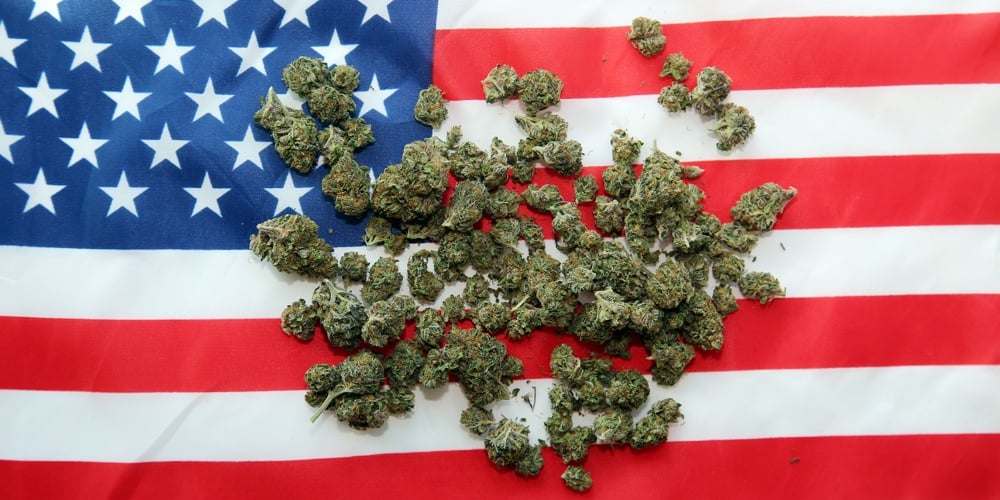What will the 2020 election mean for cannabis banking?

One of the risks associated with banking the cannabis industry, specifically marijuana-related businesses, is the disconnect between state and federal law. While 33 states (as well as the District of Columbia and Puerto Rico) have currently legalized marijuana to some extent, marijuana remains a Schedule I controlled substance and is therefore federally illegal. In states and territories with legal marijuana programs an increasing number of credit unions have made the decision to offer much-needed banking services to marijuana businesses based on guidance provided by state departments of banking and FinCEN in its 2014 guidance “BSA Expectations Regarding Marijuana-Related Businesses”. Currently the federal government, specifically FinCEN and the Department of Justice, have adopted a hand-off approach to enforcing federal marijuana laws in states with legal marijuana programs if businesses can demonstrate that they are not breaking certain law enforcement priorities like selling drugs illegally to minors.
But we’re in an election year, and that means that everything can change. So, as a credit union – regardless of whether you currently bank cannabis – you need to be aware that marijuana is on the ballot. Here’s what you need to keep an eye out for on the federal and state level.
The Democratic and Republican parties take very different public stances on the issue of marijuana legalization, so the outcome of the election might result in a continuation of the status quo or, on the opposite end of the spectrum, the federal legalization of marijuana. So, what are their positions?
The 2020 Democratic Party platform advocates for the decriminalization of marijuana and its rescheduling (removing it from the controlled substances list) at the federal level through executive action. The Democratic Party’s presidential candidate, former Vice President Joe Biden, has expressed support for the former in campaign materials but has not publicly advocated for the legalization of marijuana at the federal level. Biden’s running mate, California Senator Kamala Harris, has explicitly endorsed the decriminalization of marijuana and during the vice presidential debate on October 9th said, “we will decriminalize marijuana and we will expunge the records of those who have been convicted of marijuana.” This effort would presumably follow the blueprint laid out in legislation she sponsored known as The Marijuana Opportunity Reinvestment and Expungement (MORE) Act (S 2227). Stopping short of legalizing marijuana federally, the MORE Act would among other things impose a tax on cannabis, provide cannabis businesses with access to Small Business Administration loans, and provide for the expungement of marijuana-related crimes.
On the other side of the aisle, this year the Republican Party made the decision to readopt their 2016 platform, a document that doesn’t directly advocate for or against decriminalizing or rescheduling marijuana. It acknowledges the disconnect between state and federal law but stops short of making any clear policy recommendations. For his part President Trump has yet to directly address the issue during this campaign, and his few public comments over the past four years haven’t revealed much more. In May of 2017 Trump wrote in response to the signing of the Consolidated Appropriations Act (HR 244), that it “provides that the Department of Justice may not use any funds to prevent implementation of medical marijuana laws by various States and territories. I will treat this provision consistently with my constitutional responsibility to take care that the laws be faithfully executed.”
However, while President Trump has largely avoided the issue, based on some of his public comments the cannabis industry does not count his Vice President as an ally. For example, when asked to respond to cannabis banking protections included in a proposed coronavirus stimulus package, Mike Pence remarked critically in an interview, “In the House of Representatives, I heard the other day that the bill that they passed actually mentions marijuana more than it mentions jobs.” He did not follow this up by recommending the federal government take a hard line against state marijuana programs, but he has not expressed support for decriminalization or rescheduling either. The position of the Republican Party is far more opaque than that of the Democrats.
At the same time as they are voting for president, in five states voters will also be presented with ballot initiatives seeking various degrees of marijuana legalization. In three states that currently have medical marijuana programs (Arizona, New Jersey, and Montana) the question is whether to expand access to all adults. Two of these states (Mississippi and South Dakota) currently have no marijuana programs, so if both passed this would increase the number of states that have legalized marijuana to 35. Interestingly, South Dakota voters are being simultaneously presented with the opportunity to adopt a medical-only program or legalize marijuana for both medical and adult use (usually it’s one or the other)
If there is a change in administration it is possible that marijuana may be legalized federally, and even if that is not the case it’s possible that two more states may do so independently through ballot measures. Regardless of whether or not you currently bank cannabis, you need to be aware that big changes may be coming down the pike and you may well need to reassess the risk associated with cannabis banking and adjust the parameters of your program in response. If you’re not banking cannabis, you should start putting together a plan today for how you would handle the legalization of marijuana, and the sooner you do that the sooner you’ll be able to take advantage of the opportunity that presents. What happens on November 3rd remains to be seen, but regardless of where you sit on the political spectrum the outcome of this election could profoundly affect the status of marijuana in the United States and that will in turn have a direct effect on your credit union.





